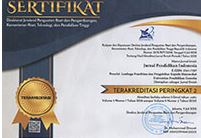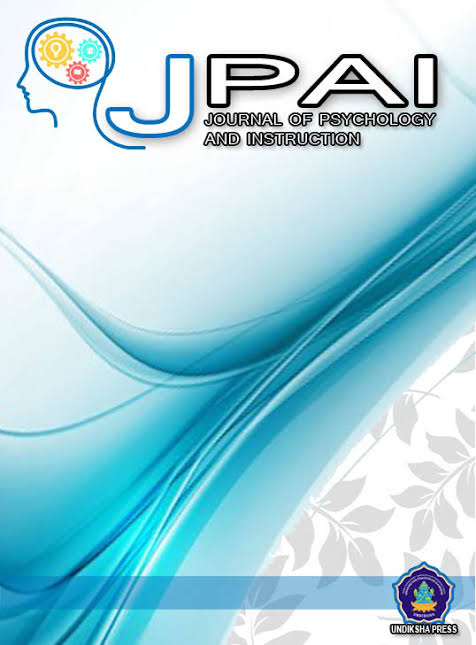The Impact of Self-efficacy Towards Speaking Performance
DOI:
https://doi.org/10.23887/jpai.v5i3.65001Keywords:
Self-Efficacy, Speaking Performance, Linear Regression ModelAbstract
This present study is an associational study that employed simple linear regression model. There were two variables in this study such as self-efficacy as the independent variable while speaking performance as the dependent one. This study was conducted at a public university in Indonesia. The subjects recruited were 75 students. The data were collected by administering a self-efficacy questionnaire which contains 28 items. The data were analyzed quantitatively using SPSS program. The results show that mostly, the students had average and high category of SE as shown by 22.7% and 38.7% respectively. Moreover, it was found that F (1, 72) = 17.950, p < 0.001. It means that statistically there was an impact of students’ self-efficacy toward students’ speaking performance. Based on the aforementioned results, it can be concluded that the students had good potential to enhance their speaking skills and their SE had significant contribution to their speaking performance.
References
Abrar, M., & Mukminin, A. (2016). International graduate classroom discussion engagement, challenges, and solving strategies. Asia Pacific Collaborative Education Journal, 12(1), pp. 5-19.
Aida, Y. (1994). Examination of Horwitz, Horwitz, and Cope's construct of foreign language anxiety: The case of students of Japanese. Modern Language Journal, 78(2), pp. 155–168. http://dx.doi.org/10.1111/j.1540-4781.1994.tb02026.x
Asakereh, A., & Dehghannezhad, M. (2015). Student satisfaction with EFL speaking classes: Relating speaking self-efficacy and skills achievement. Issues in Educational Research, 25(4), pp. 345-363.
Bachman, L., & Palmer, A. S. (1996). Language Testing in Practice. Oxford: Oxford University Press.
Bandura, A. (1977). Self-efficacy: Toward a unifying theory of behavioral change. Psychological Review, 84, pp. 191-215. https://doi.org/10.1037//0033-295x.84.2.191
Bandura, A. (1982). Self-efficacy mechanisms in human agency. American Psychologist, 37, pp. 122- 147. https://doi.org/10.1037//0003-066x.37.2.122
Bandura, A. (1993). Perceived self-efficacy in cognitive development and functioning. Educational Psychologist, 28, pp. 117-148. DOI: https://doi.org/10.1207/s15326985ep2802_3
Bandura, A. (1997). Self-Efficacy: The exercise of control. New York, NY: W.H. Freeman and Company.
Bandura, A. (2006). Guide for constructing self-efficacy scales. In F. Pajares & T. Urdan (Eds.). Self-efficacy beliefs of adolescents, (Vol. 5., pp. 307-337). Greenwich, CT: Information Age Publishing.
Bandura, A., Barbaranelli, C., Caprara, G.V., & Pastorelli, C. (2001). Self-Efficacy beliefs as shapers of children’s aspirations and career trajectories. Child Development, 72, pp. 187-206.
Battacharya, S. (2017). A study on the factors affecting ESL learners’ English speaking skills. International Journal of English Research, 3(4), pp. 31-37.
Burn, A., & Joyce, H. (1997). Focus on Speaking. Sydney: National Center and Research.
Crystal, D., & Varley, R. (1993). Introduction to language pathology. London: Whurr.
Demir, S. (2017). An evaluation of oral language: The relationship between listening, speaking and self-efficacy. Universal Journal of Educational Research, 5(9), pp. 1457-1467. DOI: https://doi.org/10.13189/ujer.2017.050903
Dincer, A., & Yesilyurt, S. (2013). Pre-service English teachers’ beliefs on speaking skills based on motivational orientations. English Language Teaching, 6(7), pp. 88-95. DOI: http://dx.doi.org/10.5539/elt.v6n7p88
Doff, A. (1998). A training course for teacher. London: Cambridge University Press
Fukai, M. (2000). Foreign language anxiety and perspectives of college students of Japanese in the United States: An exploratory study. Japanese Language Education around the Globe, 10, pp. 21–41
Habibi, S., & Yazdani, S. (2016). Is there any relationship between self-efficacy and oral presentation ability of TEFL students in the class? International Journal of Advanced Biotechnology and Research, 7(4), pp. 590-596.
Haidara, Y. (2016). Psychological factors affecting English speaking performance for the English learners in Indonesia. Universal Journal of Educational Research, 4(7), pp. 1501-1505. https://doi.org/10.13189/ujer.2016.040701
Harmer, J. (2007). The practice of English language teaching. New York, NY: Pearson Longman.
Horwitz, E. K. (2001). Language anxiety and achievement. Annual Review of Applied Linguistics, 21, pp. 112–126. https://doi.org/10.1017/s0267190501000071
Horwitz, E. K., Horwitz, M. B. & Cope, J. (1986). Foreign language classroom anxiety. The Modern Language Journal, 70, pp. 125-132. https://doi.org/10.2307/327317
Koohsa, B., Ketabi, S., & Kassaian, Z. (2011). The effects of self-esteem, age and gender on the speaking skills of intermediate university EFL learners. Theory and Practice in Language Studies, 1(10), pp. 1328-1337. DOI: http://dx.doi.org/10.4304/tpls.1.10.1328-1337
Latha, B.M., & Ramesh, P. (2012). Teaching English as a second language: Factors affecting learning speaking skills. International Journal of Engineering Research & Technology, 1(7), pp. 1-6.
Leong, L-M., & Ahmadi, S.M. (2017). An analysis of factors influencing learners’ English speaking skill. International Journal of research in English Education, 2(1), pp. 34-41.
MacIntyre, P. D., Dörnyei, Z., Clement, R., & Noels, K. A. (1998). Conceptualizing willingness to communicate in a L2: A situational model of L2 confidence and affiliation. Modern Language Journal, 82, pp. 545-562. https://doi.org/10.1111/j.1540-4781.1998.tb05543.x
McPheat, S. (2010). Effective communication skills. UK: MTD Training & Ventus Publishing ApS.
Nation L. S. P. (2001). Learning vocabulary in another language. Cambridge: Cambridge University Press
Newby-Fraser, E., & Schlebusch, L. (1998). Social support, self-efficacy and assertiveness as mediators of student stress. Journal of Human Behavior, 34, pp. 61-69.
Nunan, D. (1992). Research Methods in Language Learning. Cambridge: Cambridge University Press.
Ochoa, C., Cabrera, P., Quinonez, A., Castillo, L., & Gonzalez, P. (2016). The effect of communicative activities on EFL learners’ motivation: A case of students in the Amazon region of Ecuador. Colombian Applied Linguistics Journal, 18 (2), pp. 39-48. DOI: http://dx.doi.org/10.14483/calj.v18n2.10018
Othman, F. H. M. A., & Shuqair, K. M. (2013). The impact of motivation on English language learning the Gulf States. International Journal of Higher Education, 2(4), pp. 123-130.
Pagaduan-Apsotol, E. S. (2017). Assertiveness, self-esteem and academic performance in speech and oral communication of Filipino junior secondary teacher education students. Asia Pacific Journal of Multidisciplinary Research, 5(3), pp. 36-42.
Pajares, F. (1996). Self-efficacy beliefs in academic settings. Review of Educational Research, 66(4), 543-578. http://dx.doi.org/10.3102/00346543066004543
Pajares, F. (2000). Current directions in self-efficacy research. In M. Maehr & P. R. Pintrich (Eds.), Advances in Motivation and Achievement, Volume 10, (pp. 1-49). Greenwich, CT: JAI Press.
Rashidi, N., Yamini, M., & Shafiei, E. (2011). Oral communication apprehension and affective factors: Self-esteem and introversion/extroversion. Journal of English Language Teaching and Learning, 5(7), pp. 145-174.
Sadri, G., & Robertson, I. T. (1993). Self-efficacy and work-related behavior: A review and meta- analysis. Applied Psychology, 42, pp. 139-152.
Schwarz, R. L. (2005, November). Taking a closer look at struggling ESOL learners. Focus on Basics, 8(A), pp. 29-32.
Shumin K. (2002). Factors to consider: Developing adult EFL student speaking abilities. In J. C. Richards & W. A. Renandya (Eds.), Methodology in language teaching: An anthology of current practice, (pp. 204-211). New York, NY: Cambridge University Press.
Thornbury, S. (2005) How to teach speaking. Harlow: Pearson Education Limited.
Tuan, N. H. & Mai, T. N. (2015). Factors affecting students’ speaking performance at Le Thanh Hien high school. Asian Journal of Educational Research, 3(2), pp. 8-23.
Ur, P. (1996). A Course in Language Teaching. Practice and Theory. Cambridge: Cambridge University Press.
Vigoya, F. S. T. (2000). Testing accuracy and fluency in speaking through communicative activities. HOW, 5(1), pp. 95-104.
Zhang, S. (2009). The role of input, interaction, and output in the development of oral fluency. English Language Teaching, 2(4), pp. 91-100. https://doi.org/10.5539/elt.v2n4p91
Downloads
Published
Versions
- 2023-08-04 (2)
- 2023-07-09 (1)










